#Tanith First-and-Only
Explore tagged Tumblr posts
Text
ArtStation - Gaunt's Ghosts
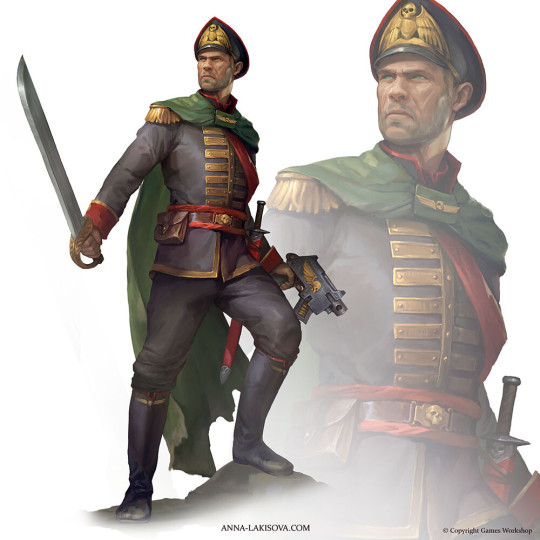




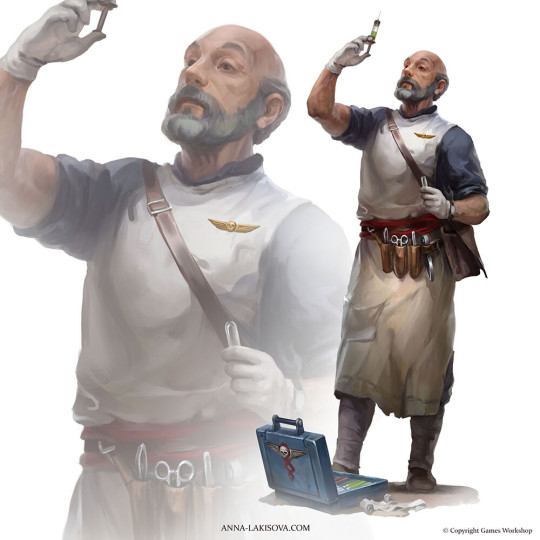


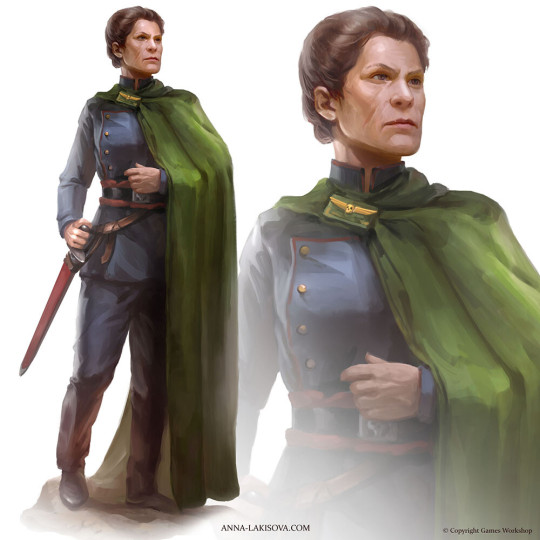
#warhammer 40000#warhammer 40k#wh40k#warhammer40000#warhammer40k#astra militarum#imperial guard#Tanith First#Tanith First-and-Only#Tanith First and Only#Tanith 1st Regiment#Tanith#Fething Tanith#Straight Silver#Scouts#Snipers#Marksmen#Light Infantry#Gaunt's Ghosts#feth#imperium#loyalists#sabbat crusade#Dan Abnett
68 notes
·
View notes
Text

Thought of the Day: Perseverance and silence are the highest virtues
67 notes
·
View notes
Text
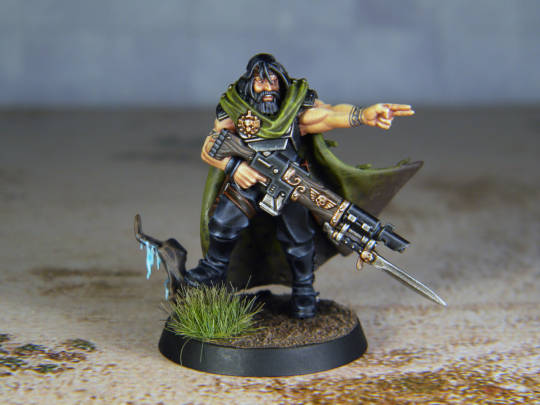

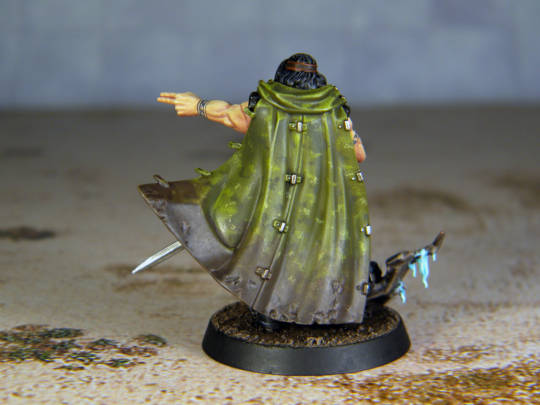



Colonel CoIm Corbec from Gaunt’s Ghosts. We'll be adding a Gaunt’s Ghosts tutorial to our Patreon.
#nightscalestudio#gaunt's ghosts#astra militarum#imperial guard#tanith#Tanith first-and-only#warhammer#warhammer40k#warhammer40000#miniaturepainting#paintingminiature#painting comission
39 notes
·
View notes
Text
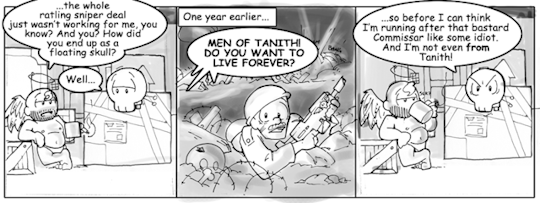
13.
Source LostInSpaceComic
9 notes
·
View notes
Text








Successful cosplay day at Adepticon today
13 notes
·
View notes
Text
youtube
Games Workshop!!! We need an animated series of Gaunt's Ghost.
Do you want us to pay for Warhammer+? Then give us content!!!!
#i am not exaggerating when i say i could commit serious crimes to achieve this#i want my middle age war criminals#is it so hard?#ibram gaunt#first and only#tanith first#imperial guard#astra militarum#gaunt's ghosts#commissar gaunt#imperium of man#warhammer 40k#warhammer 40000#Youtube
83 notes
·
View notes
Text
How can his nerdy side get any more epic!! FOR THE EMPEROR AND SANGUINIS!! Blood Angels are my boys, along with the Tanith-First-and-Only (Gaunt's Ghosts) who aren't a chapter, but a group of badass men.
#henry cavill#henrycavill#Blood Angels#Warhammer 40k#warhammer 40000#space marines#Games Workshop#Tanith-First-and-Only#gaunt's ghosts
40 notes
·
View notes
Note
If you play 40k what's your faction?
‘‘Only in Death does Duty end.’’

侍 headless
4 notes
·
View notes
Text
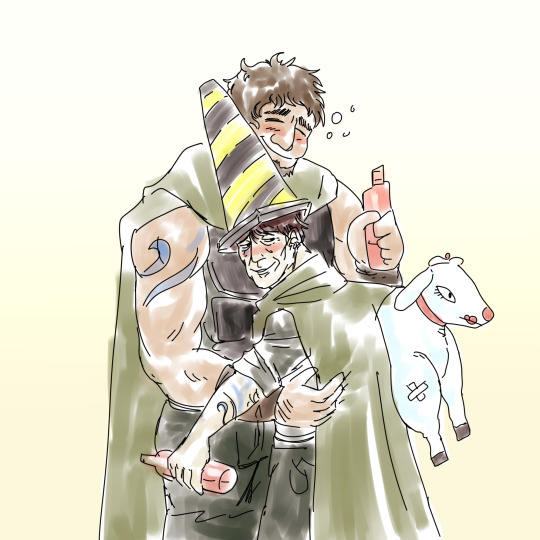
Boys out on the lash 🍻
#warhammer#warhammer 40k#hlaine larkin#try again Bragg#sweetie#guant's ghosts#tanith first and only#cone and blow up sheep was manifested by the drunk warp
30 notes
·
View notes
Text
Tanith Lee Recs
Since Tanith Lee deserves to be known for much more than having been plagiarized, I thought I'd share some recommendations. She had a HUGE body of work, and I've seen it suggested that the reason she never became a household name in fantasy and science fiction is that she wrote so many things that were different from each other, rather than staying in one easily labeled niche. I've only begun to make a dent in her catalogue, but here's the stuff I liked the best.
Note: A lot of her stuff can be disturbing, and I can't remember everything well enough to give perfect trigger warnings.
Red as Blood and Redder Than Blood: These fairy tale collections are being talked about now for the title story, but my favorite is The Golden Ladder, an incredibly creepy and hot version of Rapunzel, or perhaps When the Clock Strikes, a horrifying beautiful take on Cinderella.
The Weird Tales of Tanith Lee: As you can see, I love her short stories. These are all the ones published in Weird Tales, which includes some of the above fairy tales (including When the Clock Strikes) but also Arthurian, steampunk and science fiction stories. It's a great sampler of all the things she could do.
Blood 20: One more short story collection! This one is (most of) her vampire stories, so I know you goths will like it! There are things erotic, fantastical and grotesque in here, but to me the most haunting is the tragically mundane The Vampire Lover.
The Secret Books of Paradys: In this series, an alternate history of Paris, bad things happen. Supernatural things, sexual things, horrifying things. And sometimes good things happen, such as a man saved by a Jewish sage an his beautiful daughter who then actually converts to Judaism.
The Secret Books of Venus: I've only read the first entry in this similar series about an alternate world version of Venice, but once again it leaves the reader feeling totally transported to this sometimes sinister, sometimes lovely place where romance and cruelty live next door to each other.
Vivia: This tragic medieval plague-influenced vampire story is maybe the darkest thing of hers I've read, but dear god can she paint a picture with words. Along with The Birthgrave (which I didn't like as much), George RR Martin definitely pulled a lot of Danaerys's story from the title character here.
Islands in the Sky: And now for something completely different- a children's book. I remember finding this at the library as a kid and wanting to cry when it was over, because it gave me an equal sense of wonder and happiness as The Lion the Witch and the Wardobe, which I hadn't known was possible and worried would never happen again.
...but if you're like me, you'll just see which of her books you find at the library and used bookstores. You may not love every single thing, but it will always be interesting!
3K notes
·
View notes
Text
Tales from the Flat Earth by Tanith Lee
A few thoughts on the supposed similarities with The Sandman—with actual comparisons (and a summary of the most important beats for those who want it)…
[This post is super long. It contains a lot of different thoughts, that’s why I broke it down into three parts: 1. General Considerations, 2. Boroson’s Claims and 3. A beat-by-beat summary of all five volumes of Tales from the Flat Earth. You might want to read this in instalments, or you might want to leave part three if you are still planning to read any of the five volumes.]
Part One: General Considerations
By now, many of you will have heard of Tanith Lee’s series “Tales from the Flat Earth”—not because the world all of a sudden woke up to a literary genius, but because of a Facebook post by Matthew Boroson in the immediate aftermath of the sexual assault allegations against Neil Gaiman. Boroson now made a further statement that he will “delete […] challenges so he can live”. I completely get the exhaustion of a post going viral—been there, got the T-Shirt—but why not just ignore it? Switch off notifications or comments altogether? Actively censoring only the people with different opinions, whom he even admits have mostly been engaging in good faith, because “he can’t do this 24/7”, while leaving up those in agreement (apparently he can do that 24/7)? He might not have thought through how bad this looks, and the irony of a man silencing dissenting voices and trying to control the conversation really shouldn’t be lost on people. But apparently, it is.
Anyway: I have absolutely no desire to defend Neil Gaiman. As should be clear from my blog, I stand with Gaiman’s victims and have done so since last summer when the allegations first broke. I believe those women, for both personal and professional reasons I won’t go into here. And I believe them, whether some author guy tells me I should or not. What grates on me is that this overshadows what’s actually important here, and I’ll get to why in a second.
I love Tanith Lee’s Tales from the Flat Earth and have read them first in the 1990s, and quite a few times since. For that very reason, I wish people would just read her work without trying to engage in a “gotcha” that is still all about Gaiman and not her. She was a great and talented writer who deserves more than now forever being known as “the woman whom Neil Gaiman plagiarised”. And to say it quite frankly: The sexual assault allegations can stand on their own and don’t need a male writer telling us, verbatim, “I have no difficulty believing the accusations against him. Because I know — KNOW — that he has felt entitled to take what he wants from a woman, without her permission, and without any acknowledgement of her contributions.”
I can’t even begin to say how problematic this statement is, for so many reasons. So all I’ll say is:
There is a certain tone-deafness in thinking a sexual assault claim holds even more weight because a male writer says, “See, he did this, so you should also believe that.” We should believe SA victims. Full stop. We don’t need wonky plagiarism or “inspiration without credit”-claims to give them more weight. These two things shouldn’t even be mentioned in the same sentence.
But all of that aside: Read Tanith Lee’s “Tales from the Flat Earth” because you are interested in a writer who crafted imaginative worlds in a florid prose-style that hearkens back to old fairy tales and Arabian Nights. If you only want to read it for a “gotcha”, I might be able to spare you the arduous work, although I strongly recommend you read it to come to your own conclusions (go to the source yourself. And I honestly wish more people did before they just blindly believe things). Again, spare a thought though if Tanith deserves to be “the woman NG plagiarised” to a new audience, because let’s be honest—that’s the only reason why so many people now read her works.
And that’s exactly why I thought so long and hard whether to even write this post, but there comes a point when people who actually know both works in depth need to speak up about the informational conformity bias that now has us at over 30,000 notes on Tumblr alone, all the while the person who put this into the world seems to actively censor anyone who dares to disagree. I get that Boroson’s claim is what a lot of people want to believe right now, but that doesn’t make it more true. Someone even said that “misinformation doesn’t matter in this case because only the result does.” That’s an incredibly dumb and also dangerous statement, but I’ll leave it at that.
Horrible people can create good art. We don’t need to pretend they were always hacks. We have to learn to sit with that cognitive dissonance and can disassociate ourselves from the creator regardless—because he’s an abuser.
Part Two: Boroson’s Claims
With all of that out of the road, let’s have a closer look at all that Boroson alleges in his FB post; quotes are verbatim.
1. “Despite the fact that the main character — a byronic, pale, otherworldly, deity-like character - is the prince of night and dreams.”
Here, we already have the first bit of wrong information. Azhrarn is one of the Lords of Darkness. He is the Prince of Demons. He is evil-aligned. He is not a “prince of dreams”. He is “Night’s Master” because he only walks the earth at night, and sunlight is lethal (oh?) for him. He is really nothing like Dream. One is all about rules and responsibilities, the other is about inconsistency, wickedness, mischief, changing his mind on a whim and treating humans as playthings (which he repeatedly admits himself). You could build a much stronger case for similarities between Azhrarn and Lucifer/Iblis (and Loki if you wanted to go Norse) than Dream, because Azhrarn actually hates the gods, and Lee’s whole series builds very strongly on how he (and then someone else) tries to bring them down. And Azhrarn might be older than gods, but whether he is truly more powerful depends on how you look at it—he even asks them for help at some point. Dream, on the other hand, is more than the gods. They begin in his realm, and they end there when people stop believing. Because gods come from the collective unconscious—and that’s who and what Dream is.
2. “Despite the fact that every time people see art depicting Tanith Lee's main character Azhrarn, they think it's Morpheus from the Sandman.”
This is interesting since the depiction Boroson chose for his FB claim is fanart. If you claim something like this, at least use original artwork, not works that have already gone through 20 subconscious filters. If you look at original art, you get this:


Azhrarn in the middle, Uhlume (Lord Death) to the right, Chuz (Lord Madness) to the left. And in the other picture, Azrharn in his eagle form. Which is just weird, soz. But that’s why he has feathers on his garb.
Maybe there’s a fleeting similarity in the one to the left, but there’s also literally none in the one to the right. And if you have ever read any dark fantasy of the 1980s and 90s (and even earlier), pretty much the majority of male protagonists fitted the stereotype of “pale, clad in black and byronic”. It was a dark fantasy trope—goths read that stuff in droves (I was one of them). And it became even more likely if the hero/antihero/villain was somehow aligned with the underworld. Which Azhrarn is.
And since artists are always influenced by other artworks and their own mental image of a character, have an actual description of Azhrarn’s looks from “Night’s Master”:
“marvelously handsome, with hair that shone like blue-black fire, and clothed in all the magnificence of night.”
But we also get this when he makes a not so great experience:
“He gazed to east and west, to north and south, and the face of Azhrarn, it is truly said, had become white. Long he looked, and long his pallor increased. A mortal man could not grow so pale and live.”
So we can reasonably deduce that he isn’t usually as white as Morpheus in his main form (I don’t know what else to call it)?
There are many other descriptions of a similar ilk. Is this really enough to say they look the same? Really? Instead of admitting that we might be filling in some blanks here if descriptions are so vague?
3. “Despite the fact that the dream lord's younger sibling is Death.”
That one truly made me laugh out loud. Apart from the fact that Gaiman’s Death is older and female (which one could say was a purposeful switch to “hide the tracks” 🙄)—only the least read people would assume this was in any way new or sensational and “borrowed” from any one particular writer. Hypnos (Sleep) and Thanatos (Death) are twin brothers in Greek mythology. And the closeness of Death and Dream in The Sandman (both conceptually and on a relational level) is much more of a mirror of that than the relationship between Azhrarn and Uhlume in Tales from the Flat Earth, because in all honesty: The latter two don’t get on that well, which Boroson conveniently forgets to mention. Their relationships are really nothing alike.
Hypnos is also a deity residing in the underworld, and you have to cross the river Lethe (forgetfulness/oblivion) to get to him. Lee borrows from that idea very heavily when she tells the story of Kazir visiting Azhrarn in Underearth. These are myths, told and retold by hundreds of writers over and over again, including Lee herself.
I don’t even know what to say about this one. It’s so thin that it immediately blows away if you as much as cough at it.
4. “Despite the fact that other members of his family include Delusion, Delirium.... They are not gods but beings older than gods, and when the gods die, Dream, Death, Delusion, and Delirium will remain. This family of immortal, eternal, unchanging beings, who each embody an eternal abstraction starting with the letter D.”
There are only two Lords of Darkness beginning with a D, and they are called Uhlume (Death) and Chuz (Delusion). Azhrarn is Wickedness.
There is no Dream, as I already stated. And guess what? There is also no separate Delirium. So wrong facts again. The character is Delirium’s Mistress (or at least that’s the title of the volume), and in that case, we are referring to her as being the lover of Chuz (so Delusion and Delirium are effectively the same person). And her name is Azhriaz; she is half human, half demon (and something else, but that would be too spoilery) and Azhrarn’s daughter. She looks like this in original artwork (sorry for the crappola photo):

Without wanting to give too much plot away because some of you might still want to read this: There are three Lords of Darkness (or one could argue five—more about that later) in Lee’s Tales, but they don’t all begin with a D—neither if you look at their names (their initials are A, U, C, K and A), nor at their functions (in which case it’s W, D, D, F and L).
Okay, the domains of two Lords of Darkness start with D. Is it really enough to be sure Gaiman borrowed from it, turning it into seven? Or is it perhaps far more likely that this still falls into the realm of literary archetypes? And even if Gaiman did expand on that idea—that’s not plagiarism (which, to say it very clearly, Boroson didn’t explicitly say it was. He just implied it a bit between the lines, and other people who probably didn’t read either ran with it). I don’t think it would even constitute “heavy borrowing”, especially since the characters, their relationships and the stories as such are so, so different.
Why is Boroson’s account riddled with inaccuracies? Why be so wrong in your descriptions of a work you supposedly know so well? I really don’t know. It’s either that he doesn’t know it as well as he says he does (which I can’t imagine, since he’s apparently been going on about this for years), or he purposefully misrepresents it to add more weight to it. Which looks bad to be honest. Or at least as if he’s a bit too taken with an idea and at the stage where he can’t let it go anymore.
5. “[…] description of a character who was clearly the inspiration for Gaiman’s Mazikeen.”
That’s also Chuz. As depicted in the art above, and also here:

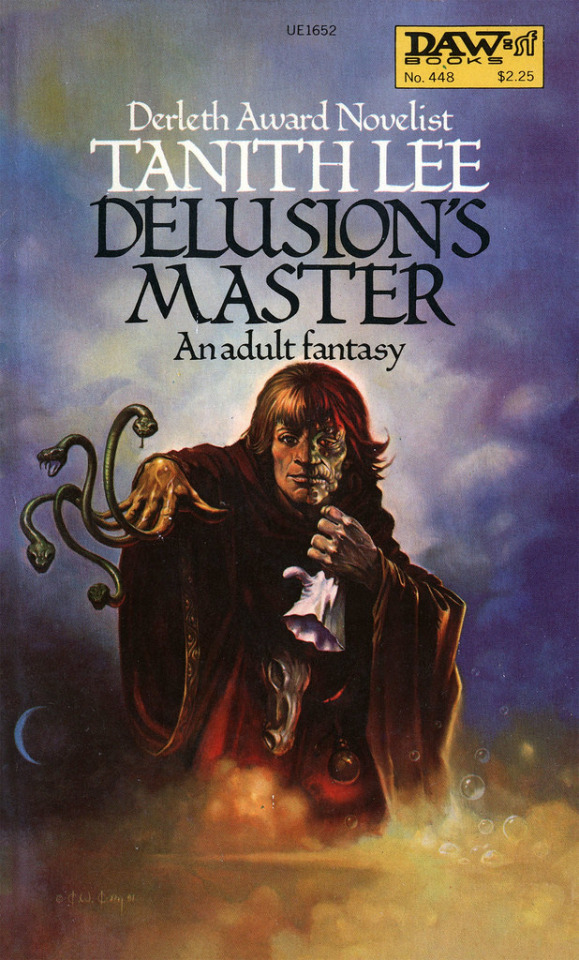
One side of him is young and beautiful, the other old. I’ll let you decide if this is clearly the inspiration for Mazikeen:
“So she beheld the entire aspect of his face, one half youthfully bronzed, one half haggardly gray, the rusty hair and the blond, but it seemed to her it was the most natural face she had ever looked on.”
And to say it quite frankly: Framing it like that is a bit dishonest to start with? It’s not the description of “a character”. It’s the volume’s protagonist. Whom Boroson earlier insisted was the inspiration for Delirium (also a bit wonky that one, as I already wrote, since I bet most of the people who don’t know Lee’s work pictured her Delirium as a woman after reading Boroson’s account). But now it’s Mazikeen all of a sudden? Leaving out he’s actually talking about the same character here looks like wilfully obfuscating that neither of it truly holds water, so he’s picking little bits and offers them without context.
Mazikeen is a visual creation of Kelley Jones btw, so maybe Boroson should also take it up with him? The same could be said to everyone who might feel tempted to shoehorn a certain other character (DC’s Destiny) into this, woefully forgetting that Destiny is not a character created by Gaiman. He has existed in the DC Universe years before Lee wrote Tales from the Flat Earth. I don’t hear anyone complaining that Lee stole Kheshmet/Fate from DC because it would be quite frankly idiotic—these are literary archetypes!
6. “The prose, the characters, the narrative strategies, the mythology, the story structure, all of it: Gaiman found it all in Tanith Lee's writing and never gave her any credit.”
The prose is really hard to compare because one is a novel, the other a comic. I really recommend you read both yourself so you get the full picture, but just two examples here:
Tanith Lee:
“A mile from the enameled walls of the city, where the desert lay gleaming like golden glass, a beautiful woman sat in a stone tower, and she played with a bone.
“Will he come to me today?” she asked the bone, rocking it in her arms like a child. “Or will he seek me tonight? All the stars will shine, but he will shine more brightly. For sure, he dare not come by day, for he would outshine the sun. The sun would die of shame, and the whole world grow dark. But oh, he will come. Nemdur,” said the beautiful woman, “Nemdur, my lord.”
Her name was Jasrin; Nemdur was the king whose city stood one mile to the east. Once, he had been her husband.
No longer.”
Neil Gaiman:
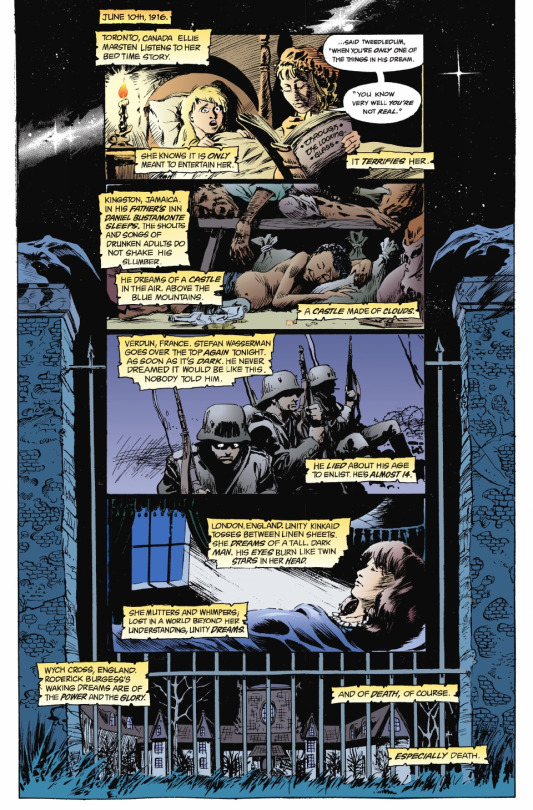
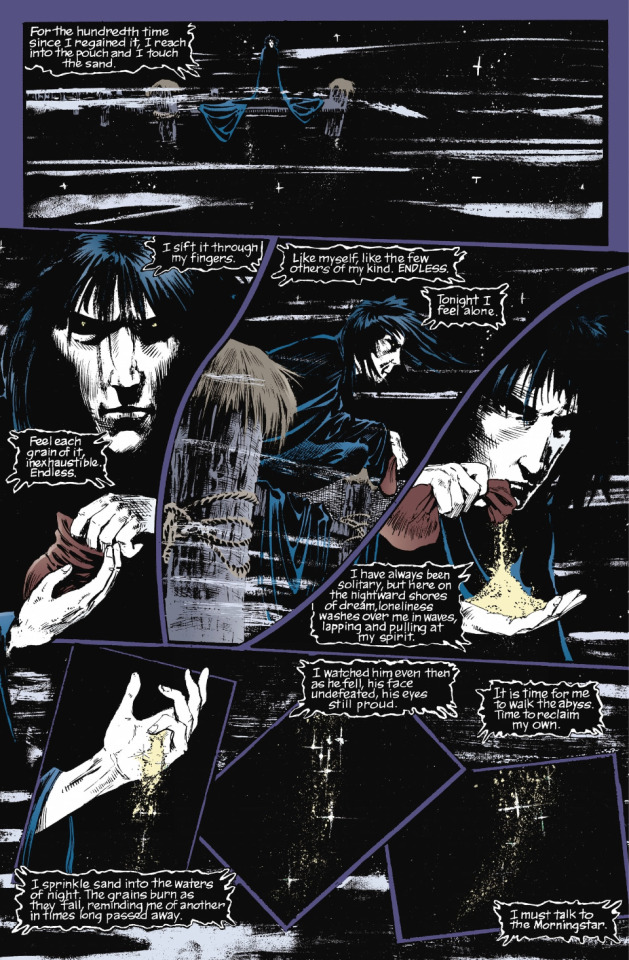
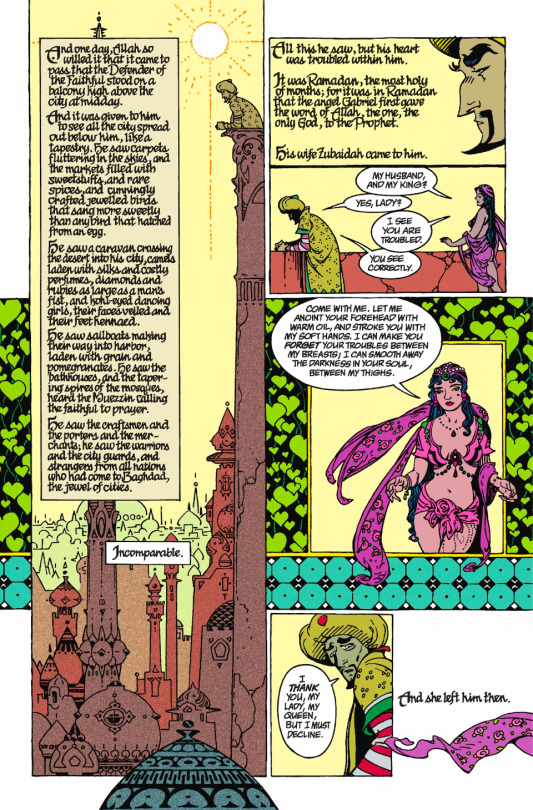
As someone who’s read both many times over, my personal assessment is:
They are not very alike. Lee writes floridly, Gaiman is often fairly to the point. Even in Ramadan, which is one (out of 75!) issues that closest resembles the style of Arabian Nights (which is Lee’s inspiration), his voice seems distinct to me—as is hers. Lee’s prose always struck me as great, Gaiman’s as good (I always loved his world building more than his actual writing style). I think Lee’s prose is more accomplished, but that’s personal taste.
Characters: I already expanded on it.
Narrative strategy: This is so vague. Does he mean perspective? Point of view? Other narrative strategies like foreshadowing?
Since I don’t know what exactly Boroson is referring to because he likes to keep it nebulous, I really can’t say, but I don’t think the way the stories are told are in any way alike. And where they seem similar (“Night’s Master”, as an example, is told as interconnected stories in the style of Arabian Nights with a throughline. And of course the Sandman also contains some interconnected stories with a throughline, although they are in no way reminiscent of Arabian Nights to me, bar Ramadan), I seriously have to ask again:
Do we believe only one writer utilises these strategies and/or has a monopoly on them? Because there are truly only so many of them to go around. And we could say that Lee’s “narrative strategy” is hardly unique either. This is just a bit silly.
Mythology: Just no. Both Lee and Gaiman use themes that have been there a million times before them, I already brushed on it. Both lean heavily into existing mythologies, with Gaiman more into Greek, and Lee into Near- and Middle Eastern one (especially Mesopotamian/Babylonian—there are some parallels between her characters and deities like Nergal, Sin/Nanna and Ninazu), although they both also use others. But the bottom line is: Both have expanded on long existing mythologies.
Story structure: Again, what is Boroson insinuating here? He is truly the master of vagueness.
To say it very directly: The story structure is not the same. If you look at The Sandman in its entirety, it’s a clear three act tragedy with a lot of Hero’s Journey thrown-in. The fact that it’s told in 10 arcs changes nothing about that—you can clearly make out Campbell’s stages, like Call to Adventure, Crossing the First Threshold, Belly of the Whale… you name it. This is long enough already, but look at Campbell’s Hero’s Journey, and it’s fairly obvious (and no, the hero doesn’t always have to survive).
Tales from the Flat Earth have a throughline in their five volumes, but they are connected more loosely, with the odd referential throwback. Only “Delusion’s Master” and “Delirium’s Mistress” have an ongoing narrative (of sorts). “Night’s Sorceries” always seemed like an afterthought of material Lee would have liked in volume four but couldn’t fit in. They are all told in a way that hearkens back to oral storytelling (hence Lee saying she was inspired by 1001 Nights), and there is a clear sense of an unchanging, but not personally involved storyteller/narrator all the way through who sometimes even offers commentary.
7. “Tanith Lee was far more progressive about Igbtq+ identities, and that was twenty years earlier.”
Well, for starters: Ten years earlier (“Night’s Master” was published in 1978, the first issue of The Sandman in 1988).
Is Tales from the Flat Earth truly more progressive? I’m not sure. Both were progressive for their time, simply because they wrote about LGBTQ+ characters at all and gave them a voice. And to put it in a disclaimer: I don’t apply moral purity standards to fiction, neither do I believe certain things that would be problematic in real life can’t be written about in fiction (and dare I say: I find that take worrying, for many reasons, but that’s a different discussion). But if we’re talking about “progressiveness”:
A clearly bisexual Demon Prince grooms a child to then seduce him on his 16th birthday—in a time when gay men were often still thrown into one pot with groomers and even pedophiles?
A lesbian queen who basically gets cursed to have sex with many, many men because only a pregnancy can lift that curse (!), finds out she is barren and can only conceive if she has sex with a dead guy, makes a deal with Uhlume who then brings a man back from the dead so she can be impregnated and then, via many many twists and turns, turns into [I’ll tell you later if you really want to know]?
I don’t know, but it’d probably be the same people who find certain angles of the Sandman problematic who would also bolt or get outraged at this? And they would 100% engage in the same type of revisionist readings they now apply to Gaiman’s works if they ever found out that Lee did anything wrong. There is a lot, and I mean a lot, of rape, SA and questionable power dynamics in Lee’s work. But it’s also a work of fiction.
8. In the 1990s, toward the end of her life, she complained in an interview that magazines weren't buying her stories anymore.
[edit: Lee died in 2015, so Boroson’s claim the 90s were “towards the end of her life” also reads a bit weird to me—as if he’s consciously trying to appeal to the sympathy of his readers by portraying her as “the poor woman on her death bed”, when she still lived for another 20 years]
That’s a bit nebulous again. It’s amazing how some people never quote their sources. I am near certain that Boroson talks about this interview from 1998, but I stand corrected if it’s a different one:
Tanith talks about her troubles getting published, but she also says it’s a hard time for everyone right now. Plus, her bibliography also clearly indicates she still got published on the regular, and that the amount of works published in any given year didn’t really fluctuate all that much apart from a burst in the ‘70s (and “burst” refers to the difference of publishing four books instead of two per year), a dip towards the end of her life (when her output was probably affected by her illness) and then the sad thing that always happens when someone dies: Suddenly, there’s another uptick.
Someone even went through the trouble of visualising her published works in a graph:
Courtesy of Das_Mime
Does this honestly look like no one published her anymore?
Now, don’t get me wrong: Of course it is a nice gesture if those more successful put in a word for those who find themselves in a bit of dry spot. But to turn this almost into some conspiracy theory is just a bit weird if I’m honest. It’s much more likely that people are simply not on someone’s radar than that they are actively trying to hinder their career. Writing is hard. Getting published is hard, even if you already have a few published works under your belt. Ask me how I know…
These were the points Boroson made that I wanted to address directly. For those of you who want to get a feel if the story as such is actually in any way similar enough to even call it heavy borrowing, I’ll now do a summary of all major story beats for all five volumes.
Part Three: Tales from the Flat Earth Beat-by-Beat
I assume that most of my followers are familiar with The Sandman, but only a few with Tanith Lee. Hence I won’t do a summary of The Sandman, and once again: You really have to read both works yourself to understand why Boroson’s claims are so far out there. I’m more than willing to discuss and answer questions that come in good faith, but I’ll say it outright: I am not interested in engaging with anyone who just comes here to peddle conspiracy theories and platitudes like “misinformation doesn’t matter in this case because…” if they haven’t even read the works in question.
Just as a quick hint, because that’s where you’ll find the superficial similarities (and that’s my phrasing it with the utmost goodwill):
If you want to compare the entirety of both works, there’s no way around reading both.
For “Night’s Master”, I’d argue you also need to read the entirety of The Sandman, because in a nutshell, it is, at least at first glance, about the heel-face-turn of its protagonist. You’ll need at least Preludes and Nocturnes and The Kindly Ones, but it makes no sense to read them separately, so…
For “Death’s Master”, maybe read The Doll’s House and Season of Mists, because it is partly about a queen who wants to save her land (everything else would be too spoilery, but just so much: The similarities are fleeting at best, and that’s already generous).
For “Delusion’s Master”: Again The Doll’s House and Season of Mists, because at its very core we have a love story that gets torpedoed by a traitor. But other than that, said love story is truly nothing alike.
For “Delirium’s Mistress”: Honestly, I thought long and hard about this. I really don’t know because it is so different from the Sandman that I see absolutely no parallels at all. Maybe read Brief Lives, because there is something in there about parent/child relationships. But they are hardly unique in literature, so once again: I truly don’t know how anyone could find similarities here. And The Kindly Ones would be such an immense stretch that I won’t even go there.
For “Night’s Sorceries”: There are three stories that give a bit of context to the rest. If anything, I’d say read The Wake. But that would actually be insinuating Azhriaz is Daniel, and I’m like… no, massive stretch. If it’s just about loosely connected stories that somewhat fit into a greater narrative, read “World’s End”. But if we’re thinking that’s already a similarity, I truly cry for literary analysis…
Briefly about the world we’re in: The Flat Earth basically consists of four planes: Upperearth, home of the gods; Earth (the Earth of humans before it changed shape); Underearth, home of Azhrarn, Prince of Demons and Wickedness; Innerearth, home of Uhlume, Lord Death. Azhrarn’s kingdom, Druhim Vanashta, houses three classes of demons: Vazdru (most like Azhrarn himself, beautiful and prone to change into eagles and other animals), Eshva (basically mute servants to the Vazdru who can change gender at will) and Drin (ugly, exclusively male creatures and accomplished creators of beautiful and practical things). All three demon kind frequently visit earth to tempt and create chaos.
Volume One: Night’s Master
Night’s Master begins with Azhrarn finding a dying woman and her newborn son, Sivesh, on a hillside. After her death, Azhrarn becomes captivated by the beauty of the child and takes him back to Underearth to raise him (and then promptly seduces him on his 16th birthday). Azhrarn then creates a woman called Ferazhin from a flower for Sivesh (because, you know, Azhrarn thinks it’s good sport to sample a woman. As one does). However, nothing can prevent Sivesh from longing to live on earth because he is human, and the decision to leave Azhrarn for a life in the light offends the Demon Prince. So he consciously tricks him into death by drowning (by chapter three).
The next storyline shifts to a collar (crafted by a Drin) from Ferazhin’s tears because she is inconsolable. We follow the collar around on its journey to different owners (who all meet a gruesome end in one way or another). The final owner, the blind bard Kazir, is the only one not to get corrupted by it, and we conclude the first book with his journey to Underearth to give the collar back to Azhrarn in exchange for Ferazhin, whom he loves without ever having met her. Azhrarn agrees to let Ferazhin go if Kazir can answer a particular question, which he can (not going to get too deep into that, apart from: Azhrarn is rattled, and we’ll revisit it at the end of this volume). Kazir and Ferazhin are happy for a while, but as usual, Azhrarn changes his mind, and by the end of it, Ferazhin is dead (a bit of a nod to Romeo and Juliet in there, but that just as an aside). But lo and behold, Kazir manages to bring her back after a while, and “somewhere perhaps, some dark door slammed like thunder in a city underground.”
Book Two of Night’s Master focuses on Zorayas, who survived the overthrow of her father (a king) as a newborn but suffered severe disfigurement. After the death of the monk who took care of her, she seeks revenge for being raped by a Prince and takes back her father’s kingdom with the help of the Drin. And, as usual, she meets her demise through trickery orchestrated by Azhrarn.
Book Three. Azhrarn’s cruel prank on a young married couple goes wrong, escalates and ultimately leads to humanity teetering on the brink of destruction (the remnants of the husband turn into Hatred and wipe out everything). After seeking intervention from the gods of Upperearth in vain, Azhrarn makes, for once, a sacrifice to preserve humanity’s existence. But does he do so completely selflessly? Could be argued, and I guess Kazir knew, but that��d be too much of a spoiler… Suffice it to say, Earth enters an age of innocence without the presence of hatred and wickedness. Until… 🤣
Volume Two: Death’s Master
Narasen, Queen of Merh, is sexually assaulted by the magician Issak. Feigning cooperation, she manages to kill him. Before he dies, he curses Narasen and Merh, declaring that both will become barren. The curse can only be lifted if Narasen (we have deduced at this point that she is a lesbian because she “doesn’t lie with men”) gives birth to a child, but includes a stipulation that prevents this solution: “Your reluctant womb will never quicken from the seed of living man.” After numerous attempts to conceive, Narasen, driven by her desire to save her land and people, makes a deal with Uhlume to conceive a child from a dead man. In return, Narasen agrees to spend a thousand years in Uhlume’s kingdom. Narasen is poisoned shortly after childbirth.
After Narasen is locked in her tomb with her newborn child Simmu, Uhlume arrives to claim her, leaving the child behind. However, Simmu is rescued by two passing Eshva and lives with them by night. Simmu develops Eshva abilities, like changing gender at will. Eventually, the Eshva grow tired of Simmu and leave him at a temple near Merh, where he grows up among monks and becomes friends and later lovers with a boy called Zhirem.
Simmu and Zhirem eventually become separated and somewhat turn into the tools of Azhrarn (Simmu hates Death because he remembers him coming for his mother) and Uhlume, respectively.
Meanwhile, Uhlume and Narasen don’t get on too well—Narasen sets herself up as Lady Death and constantly struggles for power. To get her off his back, Uhlume grants her permission to spend a day in Merh, where she promptly destroys her city (yeah, after all that trouble…). Upon her return, she gradually takes over the supervision of Innerearth from Uhlume and turns into “Lady Death.”
Azhrarn saves Simmu during Narasen’s attack on Merh. He instructs Simmu to obtain water from the Cistern of Life (a little throwback to volume one). His plan is to kill Uhlume, hence bringing death to an end. The well is guarded by nine virgins called the Golden Daughters—Simmu makes use of his gender-changing abilities and sneaks into each of their chambers as a woman and then takes their virginity as a man. With their virginity taken, the well cracks, and Simmu founds the City of Simmurad (populated by immortal humans) with the golden daughter Kassafeh (too long-winded to get into it all).
Zhirem has embarked on his own adventures and eventually returns to Earth as the magician Zhirek. He agrees to serve Uhlume, who plans to destroy Simmurad, perceiving it as a threat. With the guidance of Azhrarn, who has grown weary of Simmu and Simmurad (you see, Azhrarn is not very consistent and doesn’t abide by rules nor responsibilities like our boy Morpheus 😉), Uhlume lets Zhirek destroy the city by submerging it under water after re-introducing death via creating and killing an insect. Simmu seemingly dies at the hands of Zhirek, who casts him into a well of fire. Zhirek retires into solitude, and Simmu is ultimately saved by Azhrarn, who transforms him into an Eshva and erases all memories of his past.
The story concludes with Narasen effectively ruling Innerearth and giving death, while Uhlume spends most of his time on Earth, finding solace in the presence of Kassafeh.
Volume Three: Delusion’s Master
We’re starting with a tale about Jasrin, the young wife of King Nemdur of Sheve. Because she is jealous of her newborn child, she abandons him in the desert, where he gets killed by dogs. Nemdur banishes Jasrin to a tower, where her sanity gradually deteriorates. She is visited by Chuz, the Prince of Madness (the third Lord of Darkness). Inquiring about her deepest desires, Jasrin expresses her wish for her husband to share her madness. Nemdur awakens with a crazy plan to construct a towering structure that reaches Upperearth (where the gods live). Inspired by the legend of Simmu, he envisions attaining immortality. The Tower of Babyhelu, aptly named “The Gate to the Gods,” grows and grows until it becomes unstable due to its immense weight, causing it to collapse with catastrophic consequences: The fall of the entire kingdom of Sheve.
Azhrarn and a few of his demons are drawn to the commotion, and a conversation between him and Chuz reignites Azhrarn’s disdain for the gods, who had failed to assist him in “Night’s Master”.
Hundreds of years later, we meet 7,000 pilgrims on their journey across the desert to worship the gods at Bhelsheved (Sheve rebuilt). Azhrarn is incensed that his sacrifice to save humanity in “Night’s Master” is credited to the gods. Disguised as a prophet, he reveals that a Lord of Darkness (not the gods) is the true saviour of humanity. For this, he is lashed with a whip and sheds three drops of blood. Azhrarn continues with his quest to destroy Bhelsheved but is unexpectedly diverted by the beauty of a young priestess named Dunizel. Recognising Azhrarn’s true intentions, Dunizel bravely offers to sacrifice herself to appease his wrath. Azhrarn turns into a wolf and bites off her lower arm, but when she encourages him to bite again instead of showing terror, he hesitates. Reminiscing about his own sacrifice to Hatred, he changes his mind, heals her with his own blood, and falls deeply in love with her.
We then learn the story of Dunizel’s mentally disabled mother, who was held captive by the assistant of an astronomer (who was on a field trip to observe a comet passing by). After impregnating the girl, the assistant attempted to abort the child by exposing her to the comet’s energy as it passed. The girl was instead exposed to a rainbow of light captured by the astronomer’s magical engine, regained her sanity and gave birth to Dunizel, who was also affected by the comet’s light. Dunizel’s mother raised her but gradually transformed into a fire elemental and ascended into the sky. The assistant gave Dunizel to a grieving mother from a nearby village, who raised her until she was chosen to join the religious cult (like her mother, she is also part solar being).
We are panning back to the love story of Dunizel and Azhrarn. Dunizel gives birth to a daughter named Soveh, who is initially mistaken for a goddess on Earth and grows at unnatural speed. Through the workings of Chuz though, the truth about the child’s paternity is revealed, and Dunizel dies at the hands of an angry mob (she also comes into contact with one of the drops of blood Azhrarn had formerly shed in the desert). Devastated, Azhrarn takes Soveh, whom he renames Azhriaz, to Underearth. Before he departs, he addresses Chuz and declares their relationship as “un-brothers, un-cousins, and now, un-friends”. He also reveals he will go to war with him and considers it a kindness he has informed him in advance.
The story concludes with Chuz finding Jasrin, who is haunting her tower, and releasing her.
Volume Four: Delirium’s Mistress
So if you waited for this to start with all-out war between Azhrarn and Chuz, you’ll be disappointed. We meet Oloru, a court jester to tyrannical prince Lak Hezoor. Oloru convinces Lak Hezoor to take him on a sightseeing tour of Underearth. It’s not going well—Lak Hezoor is torn apart by Azhrarn’s red hounds. Oloru transforms into a “slender rod of yellow radiation, vaguely purplishly limned” and flies towards the island where young adult Azhriaz has been sleeping since her arrival in Underearth (it’s a been a few years). Oloru, who is actually Chuz in disguise, awakens her, convinces her to escape, and takes her back to Earth. And of course they become lovers.
Kheshmet (King Fate) enters the story, just like that, and in no time, Azhrarn arrives and ends his quarrel with Chuz— also just like that. But to atone, Chuz has to agree to live a mortal lifetime, disfigured, without his powers and truly mad. Azhriaz initially stays with Chuz, but he forgets who she is.
Azhriaz, now without Chuz, despairs. She visits her mother’s grave with Khesmet and decides to embrace her father’s legacy: discrediting the gods. She replaces a king who committed suicide and ascends to the status of a cruel goddess on Earth, conquering much of the world who revels in her cruelty. Her teachings to humanity are that the gods care nothing for them: “Remember, to the gods, you are nothing. To Azhriaz, the Goddess, you are only grains of dust or sand.”
Khesmet arrives to foretell a looming war with sea and sky.
And weirdly, that war starts because a god, whom Azhrarn kissed in “Night’s Master”, awakens and decides that was sacrilege, plus he’s also not pleased with Azhriaz’s activities on Earth. The gods consequently hurl three shards into the sun that transform into three angels—the Malhukim of the gods: Ebriel, Yabael and Melquar. Azhrarn holds the angels at bay while Azhriaz escapes into the ocean aboard a special fish-ship crafted by the Drin, pursued by Ebriel and Yabael. Azhrarn fights Melquar in the air and narrowly avoids incineration. Azhriaz escapes imprisonment in an underwater city when Yabael destroys it with his sword. She receives no assistance from Azhrarn because he lies in a death-like coma in Druhim Vanashta and has been usurped by the demon Hazrond. Eventually, Azhrarn recovers and reclaims his kingdom. Azhriaz is still pursued by Yabael, who conveniently undergoes a transformation and forgets his mission in the process. Then pursued by Ebriel, she travels with Dathanja (Zhirek making a reappearance) and ultimately engages in an eternal battle with the angel. Realising she’ll be otherwise stuck there forever, she convinces Ebriel to stop by revealing her plan to give up her immortality.
Ebriel departs, snd Azhriaz (who is actually called Atmeh at this point, but that’d lead too far) seeks out Kassafeh for a bargain with Uhlume (who is in the process of abdicating to Narasen) to become mortal. She reunites with Chuz, who has paid his penance, and they stay together for a while until Chuz helps her with her final transformation into a mortal woman.
Atmeh/Azhriaz approaches death after 200 years or so, and is visited by Azhrarn, who tells her, “Humanity is my plaything no longer, only a toy for those that are mine under the earth. But you, you are her child. You are hers. You are Dunizel. Not mine. Never mine. Though I made you to be my curse upon the world. Though I made you to be myself. You are Dunizel, that I loved, Dunizel who was the moon and sun together.” Azhrarn expresses his sadness over his inability to cry, and Azhriaz responds: “Each word you have spoken has been a tear.”
Volume Five: Night’s Sorceries
I wasn’t sure if I should even go into this one, because “Delirium’s Mistress” always seemed like the final volume to me to be honest, and it concluded the story for me. “Night’s Sorceries” is a collection of short stories that seem connected to “Delirium’s Mistress” and fill in some gaps (that’s why each of them has an introduction that explains where we are, and when). So I will only go into three of them (there are seven altogether):
“The Prodigal” is essentially about Narasen’s reign as Queen Death.
“Dooniveh, The Moon” is written like a fairy tale about a monk from Nannafir. He travels to the moon on a winged horse, and by the end of his adventures, we witness the wedding of the Moon Queen and the Sun King. And that’s connected how? Well, the winged horse was a gift from Hazrond (who usurped Azhrarn) to Azhriaz.
“The Daughter of the Magician,” recounts the tale of a magician who successfully resurrects the soul of Azhriaz. But the child, named Ezail, ends up being offered as a sacrifice to a monster. And that’s connected how? Well, the monster was created as the counterpart of the winged horse in “Dooniveh, The Moon.” But Ezail regains Azhriaz’ memory and lo and behold, Chuz just happens to appear in the reincarnation of a young boy named Chavir. Together, they decide to take the monster with them and embark on a life together.
The main reason I did include this volume is that it somewhat puts the former four in context. The last sentence of “Night’s Sorceries” is:
“Love is also an immortal.”
Which somewhat suggests that Azhriaz is operating on the same plane as Azhrarn, Uhlume, Chuz and Kheshmet. And we already get hints at that in the other volumes.
In “Delusion’s Master”, Azhrarn says to Dunizel that their child will be his feminine aspect. It’s just ambiguous enough, but we also get this in “Delirium’s Mistress” when Azhrarn wonders about love: “There is no such commodity. There is carnality, our plaything. There is worship, and there is obsession. Death you may perceive walking the world, and Fate, and Delusion, too, in a form that I have kindly granted him. But no man sees love, and no demon sees it.”
So while many of the stories of Tales from the Flat Earth can stand on their own, there is also an overarching theme: Establishing another power that serves to balance out the others: Wickedness, Death, Delusion, and Fate—Azhriaz’ four “sons” (cryptically mentioned in the final chapter of Delirium’s Mistress)...
#the sandman#sandman#tales from the flat earth#tanith lee#neil gaiman#long post#an in-depth look at#Matthew Boroson’s claims#and a full summary of all five volumes of tales from the flat earth#sandman spoilers#tales from the flat earth spoilers
167 notes
·
View notes
Text
listen i’m the first person to bring up all of rykard’s heinous deeds but i’ve seen people elsewhere argue that his painting of radahn is there only for cynical political reasons or that the abductor virgins at his mother’s and siblings’ residences are solely there to collect sacrifices but like?? rykard actually does love people genuinely and unselfishly?
Tonic in a small brass vial. Banishes distress and bitter memories. A gift bestowed by Rykard, sworn to blasphemy, to Lady Tanith, who unfortunately had no use for it. "My Lord, there could be no greater distress than to forget you."
rykard giving tanith the tonic of forgetfulness means that he really does care about her wellbeing and is willing to let her go in order to keep her safe… if he feels this way for her then why is it a stretch to say that he felt the same about his family? that he’d put up a painting of his brother just because he loves him? sometimes the worst person you know DOES have a heart. because they’re still human
220 notes
·
View notes
Text

Thought of the Day: Never forget, never forgive.
83 notes
·
View notes
Text









The Gaunt's Ghosts. painting tutorials: https://www.patreon.com/Nightscalestudio
#nightscalestudio#astra militarum#imperial guard#gaunt's ghosts#commissar gaunt#ibram gaunt#tanith first and only#tanith#warhammer#warhammer40k#warhammer40000#miniaturepainting#paintingminiature#painting comission
43 notes
·
View notes
Text




Cadian Guardsman / Tanith First And Only Guardsman / Mad Larkin / Elim Rawne
by Hector Martínez
#imperium#imperial guard#cadian shock troopers#tanith#warhammer#warhammer 40k#warhammer 40000#40k#hector martinez#sketch
120 notes
·
View notes
Note
different anon - but what are your top books that deal with incest? Books that you feel like people should definitely read at least once in their lives.
interestingly, i don't actually have many particular favorites that deal directly with incest. but some favorites are lolita ( which has a more unique relationship because dolores only really starts to think of humbert as a father after the abuse starts), mathilda by mary shelley, malina by ingeborg bachmann, the secret diary of laura palmer by jennifer lynch, the incest diary by anonymous (it's a memoir) and like, it's very much a series i first read as a tween, but i love flowers in the attic to this day. the fall of the house of usher is a short story but definitely a favorite. two more recents favorites were the winter prince, which is ya in case that's a thing for you, and dark dance by tanith lee.
i've read quite a lot of incest literature and there are plenty of good ones that i like but which aren't really personal favorites. and also some favorites that do include incest but which i don't really love because of the incest. and then there are some which i haven't read yet and have potential to become favorites, like nabokov's ada.
43 notes
·
View notes